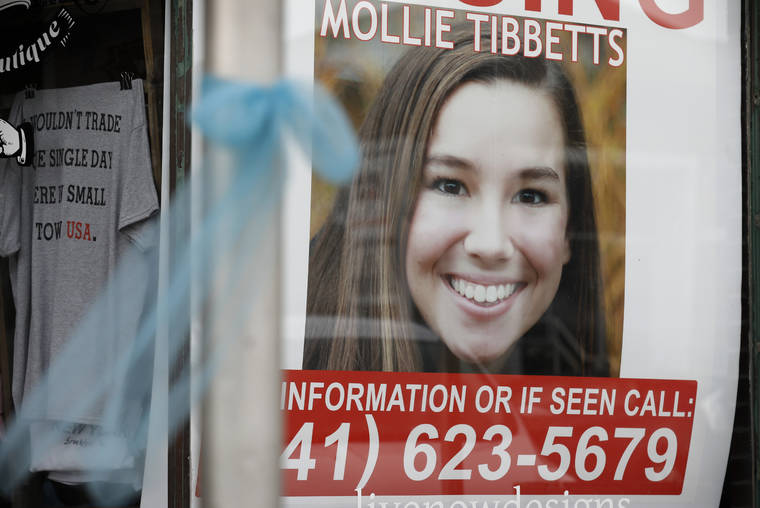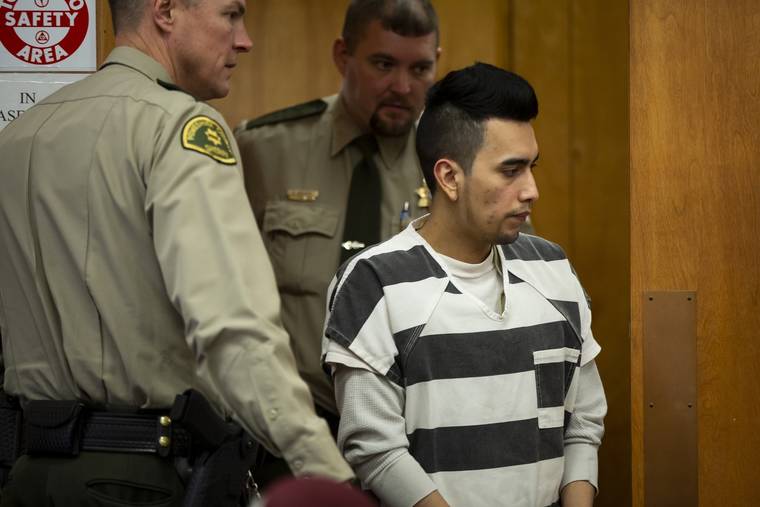MONTEZUMA, Iowa — Investigators who led the search for missing University of Iowa student Mollie Tibbetts testified Wednesday that they believe her body would have been discovered even without the suspect in her killing leading them to its location.
Their testimony came during a hearing on whether statements the suspect, Cristhian Bahena Rivera, made to police can be used at his upcoming trial for first-degree murder.
Tibbetts, 20, went missing after going out for a run on July 18, 2018, in her small hometown of Brooklyn, Iowa. Her disappearance prompted a search involving local, state and federal law enforcement and hundreds of volunteers.
Rivera, a 25-year-old dairy farm laborer, allegedly implicated himself in Tibbetts’ disappearance during a police interview that began Aug. 20, 2018. The following morning, he led investigators to a cornfield where her body was found beneath leaves.
His lawyers have asked Judge Joel Yates to suppress statements from that interrogation and the discovery of the body because he had not been read his Miranda rights warning him that his statements could be used against him. They have argued that his alleged confession was involuntary and that the evidence is tainted.
Prosecutors concede that officers didn’t read Rivera his rights when he was interviewed. But they say Tibbetts’ body would have been discovered regardless and that Rivera’s comment should be admissible evidence under legal precedent.
Agent Trent Vileta of the Division of Criminal Investigation, who oversaw the search, testified that investigators were still adding locations to search for Tibbetts when they developed Rivera as a suspect. Those would have included the area where she was found, he said.
In addition, he said, area farmers were anxious that Tibbetts would be discovered in their fields and were on the lookout.
“Nobody wanted to be the one to find her,” Vileta said.
Farmers, or searchers using drones and aircraft, would have spotted the fluorescent running shoes still on Tibbetts feet once the field’s crops were harvested in the fall, he testified.
Defense lawyer Chad Frese argued that the body could have been moved or disrupted by animals or farmers and may never have been found.
Investigators began to focus on Rivera after a homeowner’s surveillance video briefly captured a “dark figure running” that appeared to be Tibbetts, Vileta said. Further examination of the video showed a black Chevy Malibu with unusual markings that appeared to be circling the runner, he said.
Poweshiek County sheriff’s deputy Steve Kivi testified that he spotted Rivera driving that vehicle Aug. 16, 2018, and that he had a discussion with him outside his home. Then, Rivera calmly denied any involvement in Tibbetts’ disappearance and his demeanor “didn’t raise any red flags,” Kivi said.
On Aug. 20, investigators went to Rivera’s workplace to interview him and his co-workers. Rivera went to the sheriff’s office to answer questions. He admitted the Malibu on the video was his and that “he liked the way (Tibbetts) looked so he turned around to follow her,” Vileta said.
Vileta obtained a search warrant for the vehicle, and crime lab technicians found what they believed to be blood in the trunk. At that point, agents decided to hold Rivera, a Mexican national who was living illegally in the United States, on an immigration detainer, he said.
One of the questioning officers then tried to give Rivera his rights from memory but mistakenly left off one of them, Vileta said. Hours later, Rivera agreed to lead officers to the body.
If convicted, Rivera faces life in prison. His trial is scheduled for February.



